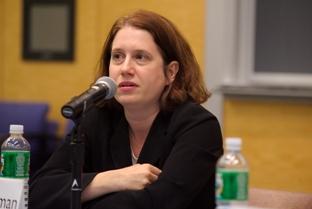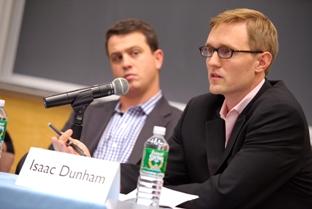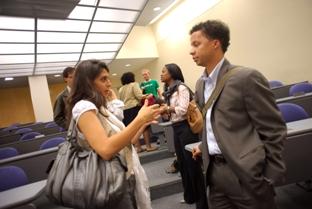Young Alumni in IP Law Panel
YOUNG ALUMNI IN IP AND ENTERTAINMENT LAW PANEL
A Candid Discussion For Current Students
Press contact: Erin St. John Kelly [email protected]
Office: 212-854-1787 Cell: 646-284-8549 Public Affairs Office: 212-854-2650
Office: 212-854-1787 Cell: 646-284-8549 Public Affairs Office: 212-854-2650
September 29, 2008 (NEW YORK) – Columbia Law School alumni who’ve found success in the tough-to-break-into fields of intellectual property and entertainment law offered advice, strategy and reassurance last Wednesday evening to approximately 50 law students in Jerome Greene Hall, at a panel organized by the Kernochan Center and the Office of Career Services.
“If you want to practice in what I still think is a glamour field, you have to stand out,” said Camille Calman ’06 (above), an associate at Debevoise & Plimpton LLP. “You have to make people understand this is something you’re really interested and not just that you want to go to movie premieres.”
That advice was echoed by the other speakers at the Law School’s annual Recent Alumni in IP and Entertainment Law Panel, all four of whom emphasized the importance of exhibiting real passion and knowledge regarding their chosen field.
One way to do that, they said, is to load up on relevant courses while at the Law School. “I took copyright. I took trademark. I took almost every IP seminar there was,” Calman said. “It helps when that stuff is on your resume.”
Calman, who served as executive managing editor of Columbia Law Review while at the Law School, also strongly suggested writing a note and trying to get it published. She said she still gets work on cyber law issues based on notes she wrote on phishing and spyware for the Law Review.
The panelists also underlined the importance of networking. Chris Poindexter ’03 said he landed his job as an associate specializing in advertising law at Davis & Gilbert LLP after meeting a recruiter at a cocktail party. Other panelists suggested that it’s never too early to start making industry connections.
“Those connections are important, easy and fun, and it’s something you can do right now in law school,” said Isaac Dunham ’04, an associate specializing in entertainment law at Schreck Rose Dapello Adams & Hurwitz LLP. That might mean participating in student organizations or landing a relevant internship. It’s also helpful to bulk up on knowledge about theater, film and television, the panelists said.
“If you’ve studied up, you can talk shop, and that makes a difference,” Dunham (below, right) said.
Ben McLean ’03 (above, left), senior counsel for Rainbow Media, cautioned students to be realistic in their expectations right out of law school, when it can be difficult to immediately land a job working on movie stars’ contracts. “It’s very hard to find that job right out of law school,” he said. Instead, it’s wise, McLean continued, to seek out a more general job at a big law firm where you can sidle your way into working on client transactions that are related to media and entertainment, if only tangentially.
Calman said she sometimes approaches partners at her firm and tells them she’s interested in working on one of their IP cases. “My firm has someone who’s in charge of assigning people to cases, but there’s also always a back channel,” she said. “And if you say to a partner, ‘This case you’re working on sounds fascinating,’ they’re going to find a way to put you on that case if they can, or they’re going to put you on the next case.”
Ryan Witte, 26, an L.L.M. student at Columbia who earned his J.D. from Florida State University earlier this year, said he came to Columbia to specialize in entertainment and IP law and is pleased to see its alumni succeed in the field.
“That makes me happy,” Witte said. “Florida State’s in Tallahassee. And there aren’t many entertainment lawyers who come from Tallahassee. [Columbia] absolutely provides me the opportunity to pursue that career.”
One student asked the panel how the recent upheaval in U.S. financial markets might affect job opportunities in entertainment law. Moderator Pippa Loengard ’03, Assistant Director of the Kernochan Center, offered a reassuring historical precedent.
“In the Depression, movies were the only thing that thrived,” she said. “I wouldn’t let it worry you too much.”
Chris Poindexter '03 chats with a student after the panel.
Columbia Law School, founded in 1858, stands at the forefront of legal education and of the law in a global society. Columbia Law School joins traditional strengths in international and comparative law, constitutional law, administrative law, business law and human rights law with pioneering work in the areas of intellectual property, digital technology, sexuality and gender, and criminal law.
—Ben Frumin


